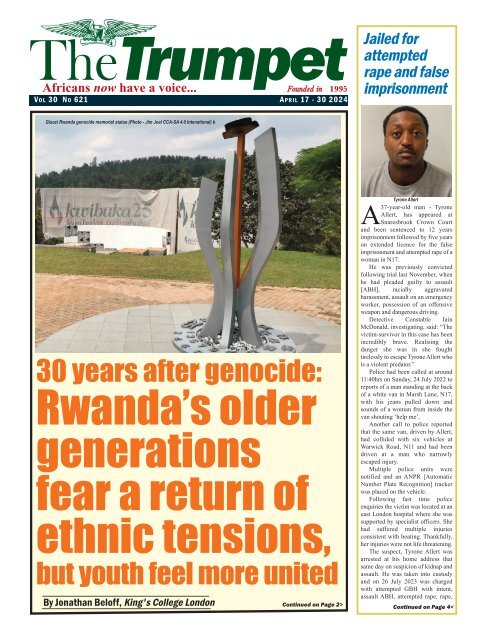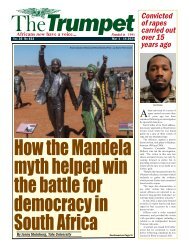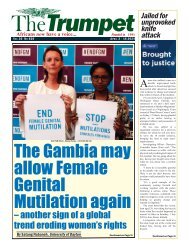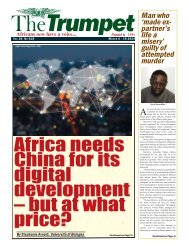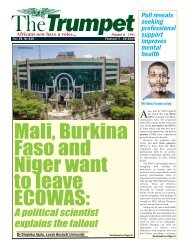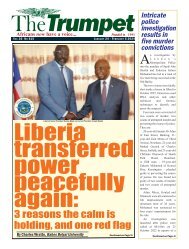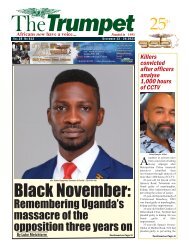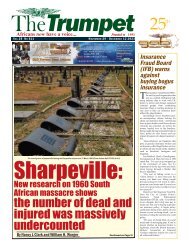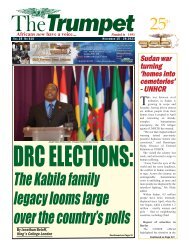The Trumpet Newspaper Issue 621 (April 17 - 30 2024)
30 years after genocide: Rwanda's older generations fear a return of ethnic tensions
30 years after genocide: Rwanda's older generations fear a return of ethnic tensions
You also want an ePaper? Increase the reach of your titles
YUMPU automatically turns print PDFs into web optimized ePapers that Google loves.
<strong>The</strong><strong>Trumpet</strong><br />
Africans now have a voice... Founded in 1995<br />
V O L <strong>30</strong> N O <strong>621</strong> A P R I L <strong>17</strong> - <strong>30</strong> <strong>2024</strong><br />
Jailed for<br />
attempted<br />
rape and false<br />
imprisonment<br />
Gisozi Rwanda genocide memorial statue (Photo - Jim Joel CCA-SA 4.0 Intenational) b<br />
<strong>30</strong> years after genocide:<br />
Rwanda’s older<br />
generations<br />
fear a return of<br />
ethnic tensions,<br />
but youth feel more united<br />
By Jonathan Beloff, King's College London<br />
Continued on Page 2><br />
Tyrone Allert<br />
A37-year-old man - Tyrone<br />
Allert, has appeared at<br />
Snaresbrook Crown Court<br />
and been sentenced to 12 years<br />
imprisonment followed by five years<br />
on extended licence for the false<br />
imprisonment and attempted rape of a<br />
woman in N<strong>17</strong>.<br />
He was previously convicted<br />
following trial last November, when<br />
he had pleaded guilty to assault<br />
[ABH], racially aggravated<br />
harassment, assault on an emergency<br />
worker, possession of an offensive<br />
weapon and dangerous driving.<br />
Detective Constable Iain<br />
McDonald, investigating, said: “<strong>The</strong><br />
victim-survivor in this case has been<br />
incredibly brave. Realising the<br />
danger she was in she fought<br />
tirelessly to escape Tyrone Allert who<br />
is a violent predator.”<br />
Police had been called at around<br />
11:40hrs on Sunday, 24 July 2022 to<br />
reports of a man standing at the back<br />
of a white van in Marsh Lane, N<strong>17</strong>,<br />
with his jeans pulled down and<br />
sounds of a woman from inside the<br />
van shouting ‘help me’.<br />
Another call to police reported<br />
that the same van, driven by Allert,<br />
had collided with six vehicles at<br />
Warwick Road, N11 and had been<br />
driven at a man who narrowly<br />
escaped injury.<br />
Multiple police units were<br />
notified and an ANPR [Automatic<br />
Number Plate Recognition] tracker<br />
was placed on the vehicle.<br />
Following fast time police<br />
enquiries the victim was located at an<br />
east London hospital where she was<br />
supported by specialist officers. She<br />
had suffered multiple injuries<br />
consistent with beating. Thankfully,<br />
her injuries were not life threatening.<br />
<strong>The</strong> suspect, Tyrone Allert was<br />
arrested at his home address that<br />
same day on suspicion of kidnap and<br />
assault. He was taken into custody<br />
and on 26 July 2023 was charged<br />
with attempted GBH with intent,<br />
assault ABH, attempted rape, rape,<br />
Continued on Page 4
Page2 <strong>The</strong><strong>Trumpet</strong> APRIL <strong>17</strong> - <strong>30</strong> <strong>2024</strong><br />
News<br />
<strong>30</strong> years after genocide:<br />
Rwanda’s older generations fear a<br />
return of ethnic tensions,<br />
but youth feel more united<br />
Continued from Page 1<<br />
It’s <strong>30</strong> years since a genocide ripped<br />
through Rwandan society, leaving up<br />
to a million Tutsi and non-extremist<br />
Hutu dead.<br />
Every year in early <strong>April</strong>, the country<br />
enters a 100-day period of<br />
commemoration during which Rwandans<br />
are asked to remember and reflect on<br />
historical divisions between the country’s<br />
main ethnic groups: Tutsi, Hutu and Twa.<br />
This is done under the banner of Ndi<br />
Umunyarwanda, loosely translated as “I<br />
am Rwandan.”<br />
This post-genocide unified ideology<br />
follows the governing Rwandan Patriotic<br />
Front’s interpretation of the country’s<br />
history. It views Tutsi, Hutu and Twa as a<br />
form of socio-economic division rather<br />
than being rooted in ethnic differences.<br />
Some Western scholars, such as Filip<br />
Reyntjens, Alison Des Forges and<br />
Catharine Newbury, dismiss this<br />
interpretation of history. <strong>The</strong>y argue that<br />
ethnicity was always an important aspect<br />
of Rwandan society and not a colonial<br />
construct.<br />
In my view, based on 16 years of<br />
<strong>The</strong> Nyamata Genocide Memorial Church where the remains of 50,000 people are buried (Photo -Dave<br />
Proffer - CC BY 2.0)<br />
Genocide Victims - Genocide Memorial Center Kigali (Photo - Adam Jones PhD, CC SA 3.0 Unported)<br />
Solicitor and Partner<br />
of an award-winning<br />
law firm<br />
S.A.J<br />
LEGAL<br />
based in the heart of<br />
Central London -<br />
Kolade Jegede<br />
specializes in:<br />
Immigration - Preparing of all<br />
Immigration matters, including<br />
Appeal Challenges and Tribunal<br />
Representation.<br />
Employment - Handling all types<br />
of Employment Claims.<br />
Family Law - Dealing with Divorce<br />
Applications, Financial Arrangements,<br />
and Applying for Non-Molestation /<br />
Occupational Orders.<br />
First consultation is FREE.<br />
T: 07818 118656 E: kj@saj.legal<br />
research on Rwanda and its public<br />
policies post-genocide, they miss an<br />
essential aspect of why Ndi<br />
Umunyarwanda exists. It was designed as<br />
a mechanism for the country to move on<br />
from its past divisions and prevent a<br />
repeat of the genocide.<br />
During recent fieldwork in Rwanda<br />
(December 2022 to March 2023 and<br />
August to September 2023), I paid<br />
particular attention to whether Ndi<br />
Umunyarwanda had taken hold in the<br />
new generation of Kigali’s residents. I<br />
attended multiple social gatherings with<br />
Kigali’s growing middle class of<br />
Rwandans between the ages of 24 and 35.<br />
During conversations with 50<br />
millennials and Gen Zs, it appeared that<br />
the government’s wish for the youth to<br />
accept Ndi Umunyarwanda had been<br />
effective. Attendees had little desire to<br />
bring up what they classified as their<br />
parents’ divisions and instead saw each<br />
other as fellow Rwandans.<br />
In my view these conversations<br />
illustrate the success of Ndi<br />
Umunyarwanda and, more broadly, the<br />
Rwandan government’s desire for postgenocide<br />
social reconstruction.<br />
But among Rwanda’s older<br />
generation, the fear of a resurgence of<br />
ethnic tensions remains alive. Many<br />
within the Rwandan government are<br />
concerned that not enough time has<br />
passed to foster a unified identity that can<br />
fully expel an ideology that wrought so<br />
much carnage.<br />
In particular, the government is<br />
acutely sensitive to the activities of the<br />
militia group, the Democratic Forces for<br />
the Liberation of Rwanda, based in<br />
neighbouring Democratic Republic of<br />
Congo (DRC). <strong>The</strong> 2,000-strong armed<br />
force includes people known to have<br />
been perpetrators in the genocide.<br />
<strong>The</strong> war on the border<br />
In Kigali, there’s been growing<br />
nervousness about the wave of violence<br />
in eastern DRC. <strong>The</strong> Congolese army has<br />
been accused of cooperating with the<br />
Democratic Forces for the Liberation of<br />
Rwanda, which is made up of remnants<br />
of Rwanda’s past genocide forces.<br />
This has driven Rwandan concerns<br />
about increased military supplies to the<br />
group, and it being given political<br />
legitimacy. However, the threat it poses<br />
doesn’t stem from its military capability –<br />
the group has little strategic, operational<br />
or tactical capabilities to defeat the<br />
Rwandan army and seize control from<br />
Paul Kagame’s government. Rather, its<br />
perceived threat stems from the views<br />
held by the people who make up the<br />
Continued on Page 3
News<br />
<strong>30</strong> years after genocide:<br />
APRIL <strong>17</strong> - <strong>30</strong> <strong>2024</strong><br />
<strong>The</strong><strong>Trumpet</strong><br />
Page3<br />
Rwanda’s older generations fear a return of<br />
ethnic tensions, but youth feel more united<br />
Continued from Page 2<<br />
force.<br />
<strong>The</strong>se fears have been further stoked<br />
by the actions and language being used<br />
by officials in Felix Tshisekedi’s<br />
government against the Banyamulenge<br />
population. This group historically<br />
originated from Rwanda but has lived in<br />
the DRC for generations.<br />
Over the past two years, violence<br />
against them – often from the DRC’s<br />
army and the Democratic Forces for the<br />
Liberation of Rwanda – has escalated.<br />
<strong>The</strong> language coming from the<br />
Congolese government is worrying<br />
Rwandan policymakers. Congolese<br />
Minister of Higher Education - Muhindo<br />
Nzangi and government spokesman -<br />
Patrick Katembwe, for instance, have<br />
openly called for the persecution of the<br />
Banyamulenge. Rwandan Foreign<br />
Minister - Vincent Biruta has said the<br />
language of ethnic hatred against the<br />
Banyamulenge that’s coming from<br />
Congolese officials reminds him of the<br />
language used by perpetrators just before<br />
the 1994 genocide.<br />
<strong>The</strong> language coming from the DRC<br />
is worrisome for Rwandan policymakers<br />
as it not only threatens the<br />
Banyamulenge, but also follows patterns<br />
that afflicted Rwandan society. But how<br />
serious is the threat to Rwanda’s postgenocide<br />
social reconstruction of Ndi<br />
Umunyarwanda?<br />
Continued on Page 4
Page4<br />
<strong>The</strong><strong>Trumpet</strong><br />
<strong>The</strong><strong>Trumpet</strong> Group<br />
Field: 07956 385 604<br />
E-mail:<br />
info@the-trumpet.com<br />
<strong>The</strong><strong>Trumpet</strong>Team<br />
PUBLISHER / EDITOR-IN-CHIEF:<br />
’Femi Okutubo<br />
APRIL <strong>17</strong> - <strong>30</strong> <strong>2024</strong><br />
News<br />
<strong>30</strong> years after genocide:<br />
Rwanda’s older<br />
generations fear a return<br />
of ethnic tensions, but<br />
youth feel more united<br />
CONTRIBUTORS:<br />
Moji Idowu, Ayo Odumade,<br />
Steve Mulindwa<br />
SPECIAL PROJECTS:<br />
Odafe Atogun<br />
John-Brown Adegunsoye (Abuja)<br />
DESIGN:<br />
Xandydesigns@gmail.com<br />
ATLANTA BUREAU CHIEF:<br />
Uko-Bendi Udo<br />
3695 F Cascade Road #2140 Atlanta,<br />
GA <strong>30</strong>331 USA<br />
Tel: +1 404 889 3613<br />
E-mail: uudo1@hotmail.com<br />
BOARD OF CONSULTANTS<br />
CHAIRMAN:<br />
Pastor Kolade Adebayo-Oke<br />
MEMBERS:<br />
Tunde Ajasa-Alashe<br />
Allison Shoyombo, Peter Osuhon<br />
<strong>The</strong><strong>Trumpet</strong> (ISSN: 1477-3392)<br />
is published in London fortnightly<br />
Continued from Page 3<<br />
Rwandans hold confidence in their<br />
government and military to protect them<br />
from security threats, including from the<br />
Democratic Forces for the Liberation of<br />
Rwanda. Nevertheless, the ideology these<br />
threats contain is seen as the primary risk<br />
of returning Rwanda to its past divisions.<br />
In my view, this risk is rather low. But<br />
concern still remains within the<br />
government, as well as among those who<br />
experienced the genocide. <strong>The</strong>ir<br />
memories of divisionism and ethnicbased<br />
hatred still influence their concerns<br />
of Rwandan security and its future.<br />
Deep-rooted scars<br />
Many within the Rwandan<br />
government, especially in the inner<br />
circles of power, either fought to end the<br />
genocide or were victims of it. <strong>The</strong> deeprooted<br />
scars of their experience influence<br />
their desire for national social reengineering.<br />
Many are still nervous that the past<br />
Hutu extremist ideology that promoted<br />
divisions and hatred, which the<br />
Some skulls at the<br />
Nyamata Memorial Site<br />
(Photo - Inisheer - CCA-<br />
SA 3.0 Unported)<br />
Democratic Forces for the Liberation of<br />
Rwanda promotes, could override the<br />
progress made by Ndi Umunyarwanda.<br />
<strong>The</strong> comfort of scape-goating others for<br />
one’s problems is often tempting.<br />
With the <strong>30</strong>th commemoration,<br />
Rwandan Embassies and High<br />
Commissions will engage with the<br />
Rwandan Diaspora. <strong>The</strong>re will be<br />
national events in Kigali, but most will be<br />
held in local villages and towns to<br />
remember the past and help foster a<br />
united future.<br />
<strong>The</strong>y need not look far to see the<br />
warning signs of how society can slip<br />
into scape-goating and how this can lead<br />
to violence. <strong>The</strong> increased violence and<br />
ethnic-based language in eastern DRC<br />
are a steadfast reminder.<br />
While the physical threats from across<br />
the border cannot be dismissed, internally<br />
Rwanda is closer to Ndi Umunyarwanda<br />
unity than genocide divisions.<br />
Jonathan Beloff is a Postdoctoral<br />
Research Associate at King’s College<br />
London.<br />
This article is republished from <strong>The</strong><br />
Conversation under a Creative Commons<br />
license. Read the original article.<br />
Jailed for attempted rape<br />
and false imprisonment<br />
THINKING<br />
OF<br />
WRITING<br />
A BUSINESS<br />
PLAN?<br />
We can help you develop a<br />
professional business plan<br />
from only £250.<br />
For more information, contact us<br />
at 07402792146 or email us at:<br />
tolu.oyewole@consultant.com<br />
Continued from Page 1<<br />
kidnap, racially aggravated harassment,<br />
assault of an emergency worker,<br />
possession of an offensive weapon<br />
[knife] and dangerous driving.<br />
<strong>The</strong> court heard how on 24 July 2022,<br />
the 28-year-old female victim had been<br />
drinking with friends and at some point<br />
had been picked up by Allert, who, seeing<br />
that she was intoxicated, had given her<br />
more alcohol and driven around with her<br />
in the back of his van. He repeatedly<br />
pulled over trying to have sex with the<br />
victim, attempting to beat her into<br />
submission.<br />
When he was taken into custody,<br />
Allert racially abused an officer before<br />
eventually assaulting him, causing<br />
injuries that required hospital treatment.<br />
<strong>The</strong> officer has since made a full<br />
recovery.<br />
In interview, he claimed that the<br />
victim had consented to getting into the<br />
van and to having sex with him –<br />
however, when his mobile phone was<br />
examined he had captured footage clips<br />
of himself verbally abusing and<br />
assaulting the victim.<br />
<strong>The</strong> victim, in the footage, was clearly<br />
heard to say that she didn’t want to have<br />
sex and at one point she said ‘this is<br />
rape’. <strong>The</strong> footage also showed her<br />
attempting to escape from the van, but<br />
Allert continually pushed her back inside.<br />
DC McDonald added: “We are<br />
dedicated to protecting women and girls,<br />
eradicating sexual violence caused<br />
largely at the hands of predatory men<br />
such as Allert, and to supporting those<br />
who are impacted by sexual assault<br />
and/or rape.”<br />
“<strong>The</strong> effects of sexual offences can be<br />
long lasting, but I sincerely hope that the<br />
victim can move forward with her life<br />
leaving Allert and his despicable actions<br />
behind her.”
News<br />
APRIL <strong>17</strong> - <strong>30</strong> <strong>2024</strong><br />
Government urges public to<br />
Stop! Think Fraud<br />
<strong>The</strong><strong>Trumpet</strong><br />
Page5<br />
Against the backdrop of data which<br />
shows that: fraud accounts for<br />
approximately 38% of all crime in<br />
England and Wales, the UK Government has<br />
launched ‘Stop! Think Fraud’ - a new national<br />
campaign against fraud which urges everyone<br />
to stop and think about whether something<br />
could be fraud before taking action. An<br />
estimated 1 in <strong>17</strong> adults were victims of fraud<br />
in the year ending September 2023.<br />
Supported by renowned financial advisor,<br />
media personality and author - Emmanuel<br />
Asuquo, the Stop! Think Fraud campaign<br />
coincides with the release of new data which<br />
reveals the hidden cost of fraud, as victims<br />
report serious mental health struggles after<br />
being targeted by criminals.<br />
More than 2,000 UK fraud victims were<br />
interviewed in the survey, which showed that<br />
over half (56%) of Black victims had struggled<br />
with their mental health in the months that<br />
followed their experience of fraud. Many<br />
Black fraud victims, (59%), reported increased<br />
anxiety and 48% experienced low-selfconfidence<br />
and self-esteem. Furthermore, 39%<br />
said they had experienced feelings of<br />
depression.<br />
Experiencing fraud also impacted the sleep<br />
of most Black fraud victims (75%), with close<br />
to a third (31%) saying it had a significant<br />
impact. Whilst victims of fraud should never<br />
feel at fault, the data showed that 64% of Black<br />
fraud victims attributed this lack of sleep to<br />
blaming themselves for the incident.<br />
As fraud continues to become more<br />
sophisticated and harder to spot, the Stop!<br />
Think Fraud campaign seeks to provide<br />
consistent and clear anti-fraud advice to the<br />
public. <strong>The</strong> campaign’s new online fraud hub<br />
draws on the expertise of leading counterfraud<br />
experts and provides concise, simple<br />
advice on how to spot fraud, stay safe and<br />
what to do if targeted – whether that is online,<br />
on the phone or in-person. It reassures people<br />
that falling victim should never have shame,<br />
stigma or fault attached to it, and signposts<br />
victims to organisations for further advice and<br />
support.<br />
Jennie was targeted by fraudsters last year.<br />
She received a WhatsApp message from<br />
someone claiming to be her brother, requesting<br />
that £600 was transferred to them as a matter<br />
Emmanuel Asuquo<br />
of urgency. Jennie replied to the message to<br />
say that she didn’t have that amount in her<br />
account, but that she could check with her<br />
husband in their joint account. <strong>The</strong> responding<br />
message stated that £400 would be sufficient.<br />
Jennie<br />
She tried calling her brother on his usual<br />
number as this request for money was unusual,<br />
but the call was cancelled. Since she was<br />
unable to get hold of her brother, she didn’t<br />
transfer any funds.<br />
Talking about her experience, Jennie<br />
says: “What this experience has taught me is<br />
that fraud can happen to anyone and that’s<br />
why, now, I’ll always take a moment to stop<br />
and check. Everything is immediate these days<br />
and we do so much on our phones, so my<br />
advice is to slow down, take your time and<br />
verify the situation before acting. For example,<br />
always check it’s the actual person or company<br />
contacting you. It’s better to be safe than<br />
sorry.”<br />
Financial adviser, media personality<br />
and author Emmanuel Asuquo, who is<br />
supporting the campaign, said: “<strong>The</strong> sad<br />
reality is that fraudsters constantly bombard<br />
people with fake texts, calls and scam content<br />
online. Since anyone can be a victim, I’d urge<br />
everyone to check out the new campaign<br />
website to find out how to spot fraud, and what<br />
to do if you are targeted.”<br />
Here are five tips from Stop! Think<br />
Fraud on how to protect yourself from<br />
fraud:<br />
Know the fraud signs: Common tactics<br />
can include impersonating an authority or<br />
‘trusted’ voice or using language that evokes<br />
powerful emotions such as fear or hope. It’s<br />
important to know the signs so you have a<br />
greater chance of avoiding fraud.<br />
Protect yourself: While you can’t stop a<br />
criminal attempting to defraud you, you can<br />
make yourself a harder target. This can be<br />
about breaking contact by closing a text, email,<br />
or conversation. Or it could be changing your<br />
online passwords to help protect yourself<br />
online.<br />
Verify and make contact directly:<br />
Always verify requests for money or personal<br />
details, even if it seems to come from a person<br />
or organisation you know. Contact people or<br />
companies directly through official websites,<br />
numbers, or email addresses.<br />
Report it: If you believe you have been a<br />
victim of fraud, you should always report it. If<br />
you live in England, Wales or Northern Ireland<br />
and have been defrauded, report it to Action<br />
Fraud online or by calling 0<strong>30</strong>0 123 2040. In<br />
Scotland, all reports of fraud should be<br />
reported to Police Scotland by calling 101.<br />
Don’t be afraid to seek help: If you have<br />
been affected by fraud, remember help is<br />
available.<br />
Is this really your son<br />
Find out how to stay ahead of scams at<br />
gov.uk/StopThinkFraud.
Page6 <strong>The</strong><strong>Trumpet</strong> APRIL <strong>17</strong> - <strong>30</strong> <strong>2024</strong><br />
Opinion<br />
Nigeria, OPL 245 and<br />
Citizen Adoke’s travails<br />
Isympathize with Mohammed Bello<br />
Adoke, referred to above simply as<br />
Citizen Adoke. Not necessarily<br />
because I know him personally, he and I,<br />
having served this country during the<br />
tenure of President Goodluck Ebele<br />
Jonathan, former President, Commander<br />
in Chief of the Armed Forces, Adoke from<br />
2010 – 2015, and this writer from 2011 –<br />
2015. I sympathize with him because of<br />
what Nigeria has done to him and how he<br />
has now become another living example<br />
of how many technocrats would rather<br />
shun the arena of public service because<br />
of how badly Nigeria has treated them,<br />
thus making it difficult for the best and the<br />
brightest to step forward to contribute to<br />
their nation’s development. I recall that<br />
many years ago, shortly after the<br />
annulment of the June 12, 1993<br />
Presidential election, and the return to<br />
civilian rule in 1999, one of the major<br />
arguments put forward by civil society<br />
was that the military having messed up<br />
the country so badly, the return to politics<br />
and governance, as the military took their<br />
exit, never again to return, should be built<br />
on the involvement and participation of<br />
distinguished Nigerian technocrats in<br />
politics – men and women who have been<br />
tested in the field of practice and who<br />
could bring their experience to the public<br />
field.<br />
This encouraged a significant number<br />
of persons – academics, lawyers,<br />
Nigerians at home and in diaspora,<br />
medical experts, engineers and<br />
accountants to elect to serve their country,<br />
if only to prove to the soldiers that the<br />
civilian populace could govern and that<br />
democracy is the best form of<br />
government. President Olusegun<br />
Obasanjo emerged from the residue of the<br />
1993 – 1999 crisis as Nigerian President.<br />
In fairness to him, he bought into this<br />
logic and recruited personnel from across<br />
the spectrum. <strong>The</strong>re were many Nigerians<br />
abroad who were persuaded to pack their<br />
luggage and return to serve their country.<br />
Other leading professionals at home<br />
joined the government, having been<br />
called upon to serve, many of them<br />
personally by Obasanjo. President<br />
Yar’Adua (2007 – 2010) also followed<br />
Obasanjo’s example. It soon became<br />
normal to have popular persons who had<br />
done well in professional practice serving<br />
in government, on the executive side and<br />
even more so in the legislature at all<br />
levels. Under President Goodluck<br />
Jonathan, the tradition continued. He had<br />
a team of bright technocrats, including<br />
some of the very best in their fields.<br />
However, the sad part of the<br />
recruitment of the best and the brightest<br />
into the governance of Nigeria is that<br />
many of these talented persons often end<br />
up either being frustrated out of the<br />
system, or they end up being set up for<br />
infractions, or at worst, as is common,<br />
they are left with bruised hearts and egos.<br />
I once heard the story of an accomplished<br />
engineer who had worked in a top<br />
engineering company in the United States<br />
who was brought home to re-design some<br />
structures for the Nigerian electricity<br />
network. He came up with his designs<br />
which he thought would be cost-effective<br />
BY REUBEN ABATI<br />
and deliver on the objective, but what he<br />
proposed would result in the demolition<br />
of some houses belonging to very<br />
powerful Nigerians. He was promptly<br />
advised to change his design to save those<br />
houses. He put up a spirited argument<br />
about engineering, cost and credibility. He<br />
was told that in this country some persons<br />
and spaces are untouchable. He quoted<br />
engineering expertise. He had to be<br />
reminded that Nigeria is not the United<br />
States. Out of frustration, the fellow<br />
packed his luggage and left. He would<br />
rank as one of the luckiest.<br />
Many others who thought that they<br />
could join the post-military train and help<br />
save Nigeria were not so lucky. <strong>The</strong>re are<br />
examples of Nigerians who have tried to<br />
save Nigeria but have paid with their<br />
lives, or the lives of their relatives, or who<br />
remain scarred for life. When they are<br />
invited to serve, it is natural for them to<br />
Continued on Page 7<<br />
Mohammed Bello Adoke (Photo - Jean-Marc Ferré, CC BY-NC-ND 2.0)
Opinion<br />
APRIL <strong>17</strong> - <strong>30</strong> <strong>2024</strong><br />
Nigeria, OPL 245 and Citizen<br />
Adoke’s travails<br />
<strong>The</strong><strong>Trumpet</strong><br />
Page7<br />
Continued from Page 6<<br />
see that as a special form of recognition,<br />
out of a large population of more than 200<br />
million people. But Nigeria is like a<br />
stockfish: when you think you can bend it<br />
with bare hands, you may end up bending<br />
your hands in the process. Many who<br />
tried did so in vain. <strong>The</strong> stories are many,<br />
and I do not want to delve into too many<br />
individual tales, because every example<br />
has its own peculiar details, true and<br />
fictional, real and imagined, since those<br />
we identify as the best and the brightest<br />
have their own individuality and moral<br />
peccadilloes.<br />
I started with Citizen Adoke and it is<br />
his story that I want to tell as I know it.<br />
He has himself told a better part of his<br />
story in his partly biographical book,<br />
Burden of Service (Clink Street, 2019) in<br />
which he reported that having attained the<br />
esteemed rank of a Senior Advocate of<br />
Nigeria (SAN), he dreamt of becoming<br />
the Attorney-General and Minister of<br />
Justice of the Federation. He shared that<br />
dream with his mother, and they both<br />
prayed over it. He not only attained the<br />
silk, he also became Nigeria’s 21 st<br />
Attorney-General of the Federation and<br />
Minister of Justice – a call of destiny for<br />
a poor, little boy from Nagazi, who read<br />
law by accident, and had to borrow a<br />
jacket for his university matriculation,<br />
only to be de-robed and humiliated<br />
publicly by the owner of the suit, and who<br />
in addition had to survive university<br />
education with the benevolence of friends<br />
who helped him with a 0-1-0 regime.<br />
Those who know, know what it means to<br />
go through university as an indigent<br />
student. After his Law School education,<br />
Adoke even had to attend his Call to Bar<br />
ceremony in borrowed robes. He had no<br />
family or relative in attendance. But he<br />
was one of those who survived the odds.<br />
He practised law in Kano, acquired more<br />
education in Switzerland, and the UK,<br />
struggled to get to the top of the game and<br />
he ended up as a Senior Advocate of<br />
Nigeria (SAN). His book, Burden of<br />
Service basically tells the story of how he<br />
got to the very top of his profession,<br />
across the ranks and in public service. He<br />
gives an account of his dedicated service<br />
and the reforms and the innovations that<br />
he brought to bear as Nigeria’s 21 st<br />
Attorney General of the Federation and<br />
Minister of Justice. It was an<br />
achievement that he loved and that he was<br />
proud of. But there were burdens and<br />
none was more punitive, like the Cross,<br />
than the experience he went through after<br />
leaving office.<br />
<strong>The</strong> Jonathan administration under<br />
which he served lost the 2015 Presidential<br />
election to an opposition party, the All<br />
Progressives- Congress (APC) which has<br />
been ruling Nigeria since then till date. As<br />
soon as the PDP lost the election, the APC<br />
even before assuming office went after the<br />
Jonathan officials. Adoke was one of the<br />
main targets. In August 2015, he left<br />
Nigeria for further studies at the<br />
University of Leiden, the Netherlands. In<br />
November 2015, he was invited for<br />
questioning by the Economic and<br />
Financial Crimes Commission (EFCC).<br />
He was accused of having collected bribe<br />
in the implementation of the OPL 245<br />
Settlement Agreement, and that he waived<br />
taxes to get some personal settlement and<br />
used the proceeds of the same illegal<br />
settlement to buy property. He was traced<br />
all the way to the Netherlands where his<br />
apartment was searched for money<br />
laundering and corruption investigation<br />
reasons. His house in Abuja and in his<br />
home town of Okene, Kogi State were<br />
also searched. He received reports that<br />
there was a plan afoot to eliminate him,<br />
and that the whole matter was not just<br />
about allegations of a felony. He offers<br />
further clarifications and details in<br />
Chapter Eight (<strong>The</strong> Witch-Hunters) and<br />
Chapter Nine (<strong>The</strong> Mischief) in Burden of<br />
Service (2019).<br />
In December 2016, he and eight others<br />
were formally charged at the Federal High<br />
Court, Abuja in respect of the OPL 245<br />
transaction. His name was mentioned in<br />
two out of the nine charges, bordering on<br />
conspiracy, aiding and abetting and<br />
money laundering. His name was further<br />
mentioned in cases in other jurisdictions<br />
– Italy and London, involving the Italian<br />
oil giant, Agip-Eni, Shell and Malabu Oil<br />
and Gas. In 2020, the EFCC again filed<br />
another case against Mohammed Bello<br />
Adoke in the Federal High Court of Abuja<br />
accusing him of collecting N<strong>30</strong>0 million<br />
gratification from the OPL 245<br />
Transaction.<br />
In Burden of Service, Adoke has<br />
argued that the allegations against him<br />
were malicious, because as he put it: “I<br />
did the best for my country. I saved my<br />
country from a certain liability of a $2<br />
billion claim by Royal Dutch Shell at the<br />
International Centre for the Settlement of<br />
Disputes (ICSID), an organ of the World<br />
Bank. More so, the $210 million signature<br />
bonus paid for OPL 245 by Shell and Eni<br />
is the highest in the history of Nigeria. I<br />
did nothing wrong. I did not take a bribe,<br />
not even a cup of water, or a slice of cake.<br />
Along the line, the narrative about my role<br />
has been severely twisted, but the dust will<br />
settle someday and the whole truth will<br />
come out as straight as an arrow. Truth is<br />
so stubborn it refuses to give up until it<br />
triumphs.” Adoke did not fold his arms.<br />
He fought every challenge to his integrity<br />
in every court and in every jurisdiction. In<br />
the Nigerian courts, he and his lawyers<br />
made a “no case submission”. In January<br />
<strong>2024</strong>, the EFCC eventually admitted that<br />
it indeed had no evidence against<br />
Mohammed Bello Adoke and that it had<br />
no objection to his “no case submission”.<br />
This was after the EFCC had presented its<br />
case for three years and after calling 10<br />
witnesses. Last week, on March 27, the<br />
Federal Capital (FCT) High Court ruled<br />
definitively in the matter with Justice<br />
Abubakar Kutigi chastising the EFCC for<br />
filing frivolous charges against Adoke and<br />
six others. He commended the<br />
prosecution for conceding that it had no<br />
credible evidence to oppose the no-case<br />
application by Adoke and others but<br />
complained that the agency simply wasted<br />
four years and that the defendant should<br />
not have been charged in the first place.<br />
<strong>The</strong> prosecution failed to prove the<br />
essential elements of the offences for<br />
which the defendants were charged. His<br />
Lordship dismissed the EFCC case, and<br />
admonished the EFCC not to file such<br />
frivolous charges in the future. In effect,<br />
the Nigerian government has lost all the<br />
cases it filed or in which it was joined in<br />
Italy, the UK and even here in Nigeria<br />
with regard to OPL 245. This is<br />
scandalous.<br />
It must be noted that in 2016, Adoke<br />
sought an order of the Federal High Court,<br />
Nigeria declaring that his involvement in<br />
the negotiation, execution and<br />
implementation of the OPL 245<br />
Resolution Agreements was in line with<br />
Section 5 of the 1999 Constitution and<br />
that he could not be held liable on<br />
personal grounds. <strong>The</strong> Court, notably,<br />
found in his favour. In 2021, the Italian<br />
Court in Milan, discharged and acquitted<br />
all defendants in the OPL 245 case. Adoke<br />
was not on trial in Milan but his name was<br />
mentioned - another victory for him<br />
nonetheless. In 2022, the Federal<br />
Government further lost its case against<br />
Adoke and JP Morgan at the Business and<br />
Property Courts of England and Wales<br />
Commercial Court. At every turn, the<br />
Nigerian Government could not establish<br />
that any fraud had been committed in the<br />
OPL 245 transaction.<br />
This is why this is a major triumph for<br />
all the defendants in the case. <strong>The</strong> full<br />
story of OPL 245 is in the public domain.<br />
Truth has now prevailed. Justice Kutigi<br />
spoke of the waste of four years by the<br />
EFCC. This is more than that. <strong>The</strong> EFCC<br />
and the Nigerian Government spent four<br />
years on a wild goose chase around the<br />
world from Italy, to London and here in<br />
Nigeria, on the frivolous pursuit of a case<br />
in which they lacked evidence. Even<br />
when courts in Italy and London<br />
dismissed the OPL 245 case, Nigeria kept<br />
at it, looking for every opportunity to nail<br />
persons they had condemned before any<br />
trial. <strong>The</strong> justice system should not work<br />
like that. This is a very bad commentary<br />
on our justice administration system. Our<br />
justice system must never be used to settle<br />
personal or political scores. In other parts<br />
of the world, before a person or an entity<br />
is charged to court, there would have been<br />
a diligent attempt to find and establish<br />
evidence and a prima facie case. Where<br />
this does not stand in the court of law, the<br />
matter is promptly dispensed with as seen<br />
in the handling of the OPL case in Italy<br />
and the UK.<br />
In Nigeria, politics is more important<br />
than the law. Cases are delayed and you<br />
could be on trial for years even when you<br />
are innocent. Once you are marked out by<br />
the State as an adversary, the evidence<br />
does not matter. Mohammed Bello Adoke<br />
and others must count themselves lucky<br />
indeed. It is now possible to see reason in<br />
Adoke’s argument that he considers<br />
himself the target of a witch-hunt by the<br />
Nigerian government. I have singled him<br />
out to praise his resilience to get justice<br />
and prove his innocence. He serves as an<br />
example of why many Nigerians would<br />
rather stay away from public service.<br />
Justice Kutigi spoke of the EFCC wasting<br />
four years. I think that has to be calculated<br />
in real terms: the EFCC wasted the time<br />
of the court and wasted all the Nigerian<br />
resources spent in pursuit of a case that<br />
has now failed from one court to another.<br />
<strong>The</strong> falsely accused lost more than<br />
four years. OPL 245 was such a cause<br />
célèbre in which members of the public<br />
took positions. For more than four years,<br />
Adoke could not even return to Nigeria.<br />
He was in exile, away from work, family<br />
and friends. In December 2019, he was<br />
intercepted in Dubai, UAE by Interpol<br />
and detained for five weeks before he was<br />
brought back to the country. Nigeria had<br />
placed the name of its former Attorney<br />
General and Minister of Justice on an<br />
Interpol list of wanted persons! And now<br />
the same country says the same man has<br />
no case to answer. Nigeria must learn to<br />
be fair and more diligent and professional<br />
in the prosecution of allegations of<br />
misdeeds. <strong>The</strong> Federal Government owes<br />
Adoke and all others in the OPL 245 case<br />
an apology. <strong>The</strong> FG must also compensate<br />
them. President Bola Ahmed Tinubu must<br />
personally put a closure to the defamation<br />
by giving the necessary directives to<br />
address this gross embarrassment and<br />
ensure that under his watch, the EFCC<br />
and other agencies do not engage in any<br />
form of gross misconduct.
Page8 <strong>The</strong><strong>Trumpet</strong> APRIL <strong>17</strong> - <strong>30</strong> <strong>2024</strong><br />
Opinion<br />
Philip Shaibu: Lessons in power<br />
By Reuben Abati<br />
Philip Shaibu, the Edo State<br />
politician who was Deputy<br />
Governor in that State until<br />
yesterday afternoon, would seem to have<br />
failed woefully to learn certain basic<br />
lessons of power. He has said that he is a<br />
victim of an act of injustice and that he<br />
would fight to the very end. He may have<br />
been led by his counsel to believe that he<br />
can fight this to the finish and get back<br />
his seat. He would be mistaken to be so<br />
misled. He had it coming. He has just<br />
been taught a few lessons in the dynamics<br />
of power play. <strong>The</strong> 48 Laws of Power is<br />
the title of a book written by Robert<br />
Greene, an American author in 1998. It<br />
was a massive bestseller, selling over 1.2<br />
million copies in the United States and<br />
even more world-wide, offering simple<br />
commonsensical advice, illustrated with<br />
narratives and historical examples to<br />
prove the point that power is a dangerous<br />
game, and only persons who understand<br />
its dynamics can survive in the palace.<br />
Greene recommends humility, obscurity<br />
and skillful navigation as the best skills<br />
of survival.<br />
One of the reasons, Philip Shaibu,<br />
Deputy Governor of Edo State got<br />
impeached yesterday was due to hubris,<br />
defined in the literature as a flaw of<br />
character. And to worsen his agony, both<br />
the Legislature and the Executive further<br />
conspired to nominate, approve, and<br />
swear in a replacement, within hours after<br />
his impeachment, in the person of<br />
Omobayo Godwins from Ibilo, Akoko<br />
Edo, the oldest local government area in<br />
Nigeria, in specifically, Edo North where<br />
Philip Shaibu himself hails from. In the<br />
power play that we have just witnessed in<br />
Edo State, it is clear that the intention of<br />
Governor Godwin Obaseki is to crush<br />
Philip Shaibu completely. He has<br />
publicly humiliated Shaibu, and forced<br />
him to know who the master of the game<br />
is. Less than a week after Easter, days<br />
after the betrayal of our Lord Jesus Christ<br />
by Judas Iscariot, Shaibu, a Christian has<br />
just been made to remember, forcefully,<br />
Acts 1: 20 – “For it is written in the book<br />
of Psalms, let his habitation be desolate,<br />
and let no man dwell therein and his place<br />
let another take”. Yesterday, someone<br />
else took Philip Shaibu’s place in Edo<br />
State.<br />
How did he get here? Philip Shaibu<br />
emerged in 2016 as the running mate to<br />
Godwin Obaseki in the gubernatorial<br />
election in that State that year. <strong>The</strong>y both<br />
won on the platform of the All<br />
Progressives’ Congress (APC). Shaibu<br />
was the unanimous choice as Obaseki’s<br />
running mate. He had behind him, the<br />
support of Comrade Governor Adams<br />
Oshiomhole who was his political<br />
Godfather and who left no one any choice<br />
in the matter. Shaibu and Oshiomhole are<br />
from the same homestead and Senatorial<br />
district. <strong>The</strong> APC won the election and<br />
assumed office in November 2016. To be<br />
fair, Shaibu and Obaseki cut the perfect<br />
picture of a team. Many were surprised<br />
because it was unusual to have a<br />
Governor and a Deputy Governor<br />
working together so peacefully like<br />
brothers. Shaibu was not just powerful,<br />
he was visible and influential. Whenever<br />
the Governor went on vacation, he<br />
handed over the reins of power to his<br />
Deputy. In 2020, when ahead of the<br />
struggle for a second term, Obaseki fell<br />
out with his former mentor, Adams<br />
Oshiomhole and had to leave the APC to<br />
find a new political abode in the People’s<br />
Democratic Party (PDP); Shaibu stayed<br />
with his principal, the Governor. <strong>The</strong> big<br />
men in the rival PDP did not want him as<br />
running mate. <strong>The</strong>y didn’t want him as<br />
part of the deal. But Obaseki and Shaibu<br />
were so much together, Obaseki insisted<br />
that Shaibu was part of the deal. He<br />
would not ditch him. He had his way. In<br />
2020, Obaseki and Shaibu began a<br />
second term in office.<br />
<strong>The</strong> Deputy Governor’s high moment<br />
came in 2021, when he led the National<br />
Sports Festival 2020, hosted by Edo<br />
State, as the Chairman of the Organizing<br />
Committee. Governor Obaseki was full<br />
of accolades for his Deputy. <strong>The</strong> Federal<br />
Government did not provide necessary<br />
funding, yet Edo State pulled it off,<br />
delivering one of the most memorable<br />
sports festivals many Nigerians had seen.<br />
Shaibu’s reputation as a go-to, can-do<br />
person soared. His political scorecard<br />
looked even brighter. At the University of<br />
Jos where he obtained a B.Sc degree in<br />
Accounting, he was President of the<br />
Students’ Union from 2000 - 2001. In<br />
2003, he was elected into the Edo State<br />
House of Assembly. He spent two terms<br />
representing Etsako West Constituency.<br />
In 2015, he won election into the Federal<br />
House of Representatives on the platform<br />
of the APC, representing Etsako Federal<br />
Constituency. Having served<br />
subsequently as Deputy Governor, and<br />
having been such a star in that position,<br />
Shaibu decided in 2023, that it was his<br />
turn to become Governor and succeed his<br />
Continued on Page 9<<br />
Mama Ijesa North
Opinion<br />
APRIL <strong>17</strong> - <strong>30</strong> <strong>2024</strong> <strong>The</strong><strong>Trumpet</strong><br />
Philip Shaibu: Lessons in power<br />
Page9<br />
Continued from Page 8<<br />
boss. <strong>The</strong> Edo Governorship election is<br />
slated for September 21, <strong>2024</strong>.<br />
Shaibu defined his declaration and<br />
ambition as “a call to destiny”. This was<br />
the beginning of his problems. He did not<br />
have the support of his principal, Obaseki<br />
who thought, along with others that Edo<br />
North where Shaibu hails from, has had<br />
more than enough shot at the<br />
Government House position in Edo State.<br />
Oshiomhole, an Etsako man, was<br />
Governor of the State for eight years.<br />
Shaibu, believed to be his relative even,<br />
was going to serve for eight years as<br />
Deputy Governor. A powerful lobby<br />
group in the State believes that the people<br />
of Edo Central should be given a chance.<br />
Since the return to democracy in 1999,<br />
only one person from Edo Central,<br />
Professor Oserheimen Osunbor had<br />
shown up as Governor but even his<br />
tenure was truncated by the courts,<br />
paving the way for Adams Oshiomhole<br />
from Edo North. Whereas Governor<br />
Obaseki has insisted that he has no<br />
preferred candidate in the election, it was<br />
clear that he did not want his Deputy to<br />
succeed him. Thus, the impression that<br />
Edo State had shown a better example in<br />
terms of the tumultuous relationship<br />
between Governors and their Deputies<br />
ended up as mere illusion in the end. <strong>The</strong><br />
fight between Shaibu and Obaseki turned<br />
messy and acrimonious, finally fitting<br />
into an established pattern with the<br />
impeachment of Philip Shaibu yesterday.<br />
It is unfortunate because it is so familiar.<br />
<strong>The</strong> office of the Deputy Governor is<br />
a creation of the 1999 Constitution to the<br />
extent that Section 187 (1) makes it clear<br />
that a candidate for the office of<br />
Governor shall not be deemed to have<br />
been validly nominated unless he<br />
nominates another candidate as his<br />
associate for his running for the office,<br />
that is a Deputy Governor. <strong>The</strong> joint<br />
ticket nature of the Gubernatorial process<br />
has been proved, beyond a scintilla of<br />
doubt in PDP and 2 ors v. Biobarakuma<br />
Degi-Eremienyo and 3 ors in the<br />
November 2019 Bayelsa Governorship<br />
election. David Lyon could not become<br />
Governor because of discrepancies in his<br />
running mate’s qualifications. Despite<br />
When the going was good - Godwin Obaseki and Philip Shaibu<br />
this twinning of the ticket, this Siamesetwins,<br />
umbilical cord connection between<br />
Governors and their Deputies, what has<br />
happened, since 1999, is that upon<br />
assumption of office, there has been no<br />
love lost between the duo. One reason is<br />
that the 1999 Constitution does not<br />
expressly assign powers to the Deputy<br />
Governor. <strong>The</strong> Governor, like the<br />
President at the Federal level, is like a<br />
monarch. He controls everything. His<br />
word is law, and so everyone from<br />
traditional rulers to lawmakers in the<br />
State House of Assembly learn very<br />
quickly that the man to fear and worship<br />
is the Governor, who claims that he is an<br />
“Executive” or that he is a “constituted<br />
authority.”<br />
This “Kabiyesi” syndrome is the bane<br />
of Nigerian politics. <strong>The</strong> Deputy<br />
Governor gets a generous mention in<br />
Section 191 of the 1999 Constitution<br />
which upholds the principle of jus<br />
accrescendi inherent in the joint ticket, to<br />
wit a Deputy takes over in the event of<br />
death, resignation or incapacitation, but<br />
which is interpreted to mean that a<br />
Deputy Governor is a spare tyre waiting<br />
for the main tyre to develop a fault so it<br />
can be replaced and he, the Deputy can<br />
become the main driver. In a superstitious<br />
country such as ours, a Deputy Governor<br />
is treated with suspicion. Any sign of<br />
self-expression or assertiveness on his or<br />
her part is seen as a sign of disloyalty.<br />
Political courters capitalize on this and<br />
have always tried to cause problems.<br />
When the Deputy and the Governor have<br />
different godfathers, the crisis is assured.<br />
It is rare to find any incumbent Governor<br />
who openly encourages his Deputy to<br />
succeed him. It happened in Zamfara<br />
once upon a time, but Alhaji Sani Yerima<br />
and his successor, Aliyu Shinkafi soon<br />
fell apart. Section 193 further reduces the<br />
role of a Deputy Governor to the<br />
discretion of the Governor. What is the<br />
pattern is conflict in Government Houses<br />
in the States and even in the Presidential<br />
Villa to varying degrees.<br />
For example, President Bola Tinubu<br />
as Governor of Lagos State, 1999 – 2007<br />
had three Deputy Governors. Mrs. Kofo<br />
Bucknor-Akerele and Mr. Femi Pedro<br />
both have stories to tell. Dr Abdullahi<br />
Umar Ganduje served as Deputy<br />
Governor to Dr. Rabiu Kwankwaso<br />
(1999 – 2003, 2011-2015) but his former<br />
boss did not consider him good enough<br />
to succeed him. He got there by his own<br />
means. <strong>The</strong>y have remained tough<br />
adversaries since then in Kano politics.<br />
<strong>The</strong> late Christopher Alao-Akala, deputy<br />
to Governor Rashidi Ladoja became<br />
Governor in 2006, only because his<br />
principal was impeached. Ladoja was<br />
reinstated by the Supreme Court in<br />
December 2006. Bala Ngilari became<br />
Governor in Adamawa state in 2014 only<br />
because Governor Murtala Nyako was<br />
impeached. In Ondo State, to cite a recent<br />
example, the late Governor Rotimi<br />
Akeredolu had issues with his Deputies.<br />
In his first term, a certain Agboola Ajayi<br />
who was his Deputy fell out of favour<br />
because he was eyeing the Governor’s<br />
seat. His successor, Lucky Aiyedatiwa<br />
would also eventually run into trouble.<br />
He is Governor today because his<br />
principal died. At State level, only 10 out<br />
of 149 Deputy Governors have taken<br />
over from their bosses since 1999, across<br />
the 36 States of the Federation; and not<br />
necessarily because their bosses wanted<br />
them there. In Kebbi, Kano, Imo, Niger,<br />
Nasarawa, Plateau and Benue States, we<br />
have seen incumbent Governors<br />
supporting candidates other than their<br />
own Deputies who stubbornly sought to<br />
succeed them. Engr. David Umahi, now<br />
Minister of Works became Governor of<br />
Ebonyi State in 2015 in spite of his<br />
former principal - Governor Martin<br />
Elechi who insisted that Umahi was not<br />
his choice. At the Federal level, the<br />
Obasanjo Presidency became a<br />
“Bolekaja Presidency” because then<br />
Vice President Atiku Abubakar wanted to<br />
unseat his boss before the 2003 general<br />
election. Obasanjo’s second term was a<br />
divided Presidency because the principal<br />
needed to teach his Deputy a lesson. In<br />
2010, it took the invocation of a doctrine<br />
of necessity to get then Vice President<br />
Goodluck Jonathan to succeed President<br />
Umaru Musa Yar’Adua first as Acting<br />
President and later as President. Those<br />
who did not want Jonathan as President<br />
never gave up.<br />
In sum, there is nothing unusual in the<br />
latest development in Edo State. What<br />
must be noted is the sheer stubbornness<br />
with which Shaibu took on the war<br />
against his principal. In the process, he<br />
was banished from Government House<br />
and restricted to a corner of Benin City.<br />
His media crew was withdrawn. He was<br />
stripped of all responsibilities. He was<br />
told in no uncertain terms that he would<br />
not be Governor. He went to court to<br />
defend his rights. He later withdrew the<br />
case. He apologized. But nothing<br />
changed. When the PDP held its Party<br />
Primaries, he organized his own event in<br />
his own house and declared himself as<br />
the chosen candidate. <strong>The</strong> next thing that<br />
came his way was the commencement of<br />
impeachment proceedings against him.<br />
On the surface of it, the State House of<br />
Assembly tried to follow the motions<br />
Continued on Page 11
Page10 <strong>The</strong><strong>Trumpet</strong> APRIL <strong>17</strong> - <strong>30</strong> <strong>2024</strong><br />
Opinion<br />
Afenifere and the<br />
progressive camp (1)<br />
When sometime in 2008, the late<br />
Yinka Odumakin invited me to<br />
his 23, Sylvia Crescent,<br />
Anthony Village-office in Lagos, little<br />
did I know that a big surprise was waiting<br />
for me. A fine gentleman with a<br />
consistent commitment to the progressive<br />
bent, Odumakin had offered to pay me a<br />
visit but since it was unYoruba for leaders<br />
and elders to initiate the kind of visit he<br />
was envisaging, I opted for the opposite.<br />
And there I was, face-to-face, with the<br />
inimitable Odumakin and the irresistible<br />
Jimi Agbaje, aka JK. One thing led to<br />
another and I eventually became the<br />
pioneer Administrative Secretary of the<br />
Afenifere Renewal Group (ARG), under<br />
the national chairmanship of Olawale<br />
Oshun.<br />
Notable members of the prestigious<br />
Group included Ayo Afolabi, former<br />
Governor Kayode Fayemi of Ekiti State,<br />
Babafemi Ojudu, Bisi Adegbuyi, Oye<br />
Oyewumi, Lai Oyeduntan, Olutola<br />
Mobolurin, Ademola Oyinlola, Tokunbo<br />
Ajasin, Jumoke Anifowose, Biodun<br />
Oyebanji, Zacch Adedeji and Agbaje.<br />
Among others were Kunle Famoriyo,<br />
Ropo Sekoni, Charles Akinola,<br />
Adedamola Dada and the now-deceased<br />
former Deputy Governor Funmilayo<br />
Olayinka of Ekiti State (1960 – 2013),<br />
Dipo Famakinwa (1967 – 20<strong>17</strong>),<br />
Bayonile Ademodi (1952 – 2020) and, of<br />
course, Odumakin (1966 – 2021).<br />
On March 26, <strong>2024</strong>, Oshun clocked<br />
74 years on the Planet Earth and a group<br />
of intellectuals in the Southwest under the<br />
leadership of Professor Lai Olurode<br />
converged on his Ijebu-Imushin country<br />
house in Ogun State to honour this man<br />
of many parts with a Roundtable<br />
Discussion on the Governance Crisis in<br />
Nigeria.<br />
Oshun has done well and he deserves<br />
to be celebrated. He has paid his dues but<br />
then, only an ungrateful heart would also<br />
say that God has not been good to this<br />
delightful ideologue of the All<br />
Progressives Congress (APC) bent. So,<br />
he has no reason to complain! Author,<br />
journalist and farmer, he’s a former Chief<br />
Whip of the Federal House of<br />
Representatives and prominent member<br />
of the defunct National Democratic<br />
Coalition (NADECO). He was also a<br />
close ally of the late MKO Abiola, the<br />
STALLIONS AIR<br />
Ipanema Travel Ltd<br />
AFRICA FLIGHTS<br />
SPECIALISTS<br />
LAGOS fr £477<br />
(2 Bags)<br />
020 7580 5999<br />
07979 861 455<br />
Call AMIT / ALEX<br />
73 WELLS ST, W1T 3QG<br />
All Fares Seasonal<br />
ATOL 9<strong>17</strong>9<br />
BY ABIODUN<br />
KOMOLAFE<br />
winner of the June 12, 1993 Presidential<br />
election. As a matter of fact, Oshun was<br />
reportedly one of the few, prominent<br />
faces at the historic Epetedo Declaration<br />
on June 11, 1994. ARG under Oshun’s<br />
leadership produced the Development<br />
Agenda for Western Nigeria (DAWN)<br />
Strategy Roadmap which led to the<br />
formal inauguration of DAWN<br />
Commission by the Southwest Governors<br />
in July 2013.<br />
It is important to note that ARG was<br />
formed “with the stated intent of<br />
reuniting the feuding factions” in<br />
Afenifere and as “a necessary body to<br />
preserve the ethnic identity of the<br />
Yorubas.” If one may therefore ask, how<br />
smooth has the journey of hope which the<br />
Group brought to the Yoruba race with its<br />
formation been and how many of its<br />
founding philosophical objectives have<br />
been realized? Looking around today, the<br />
mainstream Afenifere has become more<br />
of a wrong noise than communal<br />
togetherness. While one faction, led by<br />
Reuben Fasoranti, is obviously looking in<br />
the direction of ‘E lo f’okan bale’, the<br />
other, headed by Ayo Adebanjo, is<br />
excruciatingly Obidient-compliant. Since<br />
the guardians of society are either dead or<br />
deep in slumber, Yoruba people have<br />
become deeply divided and that’s to our<br />
collective hurt!<br />
Beyond its sequined glint, Yorubaland<br />
had expected Afenifere to serve as a very<br />
powerful research institution like the<br />
Chatham House in London. Though ARG<br />
has done one or two things along this<br />
line, it is unfortunate that what we now<br />
have is more of interest-leaders and selfservers<br />
who have developed an<br />
unsatisfying urge for political slots for<br />
their children and concubines thereby<br />
leaving the children of the poor with no<br />
future! And they have succeeded in doing<br />
that! And nobody, except the Stone of<br />
Israel, can put an end to it!<br />
In the days of Obafemi Awolowo,<br />
Adekunle Ajasin and Abraham Adesanya,<br />
the fear of Afenifere was the beginning of<br />
wisdom for any Governor who wanted to<br />
access relevance in the Zone, even<br />
beyond. How come that has faded away<br />
so soon? Where did the rain start beating<br />
the Yorubas and who are the giants and<br />
strongholds who want Yorubaland to not<br />
remain even stagnant but speedily<br />
Continued on Page 11
Opinion<br />
APRIL <strong>17</strong> - <strong>30</strong> <strong>2024</strong> <strong>The</strong><strong>Trumpet</strong><br />
Philip Shaibu: Lessons in power<br />
Page11<br />
Continued from Page 9<<br />
prescribed in Section 188 of the Constitution on the removal of<br />
a Governor or Deputy Governor from office. Shaibu and his<br />
lawyers claim that the House acted in violation of an ongoing<br />
process at a Federal High Court. Abuja. Without prejudice to<br />
Section 188 (10), the only remedy available to Shaibu is to<br />
prove in court that his removal was unconstitutional and seek<br />
to rely perhaps on Rashidi Ladoja’s case – see Muyiwa Inakoju<br />
and Ors. vs. Abraham Adeleke, Rashidi Ladoja and ors. (2007).<br />
But the times are different. <strong>The</strong> circumstances have changed.<br />
Shaibu’s political future hangs in the balance.<br />
Whatever tricks his lawyers may still think they have in<br />
their bags, when Shaibu is alone let him reflect on how he<br />
ignored the laws of power. Law One says: “Never Outshine the<br />
Master.” Shaibu got so carried away he began to sound as if he<br />
was the master of the Governor. He openly boasted that without<br />
him, Obaseki could never have been Governor and that he in<br />
fact funded his ambition and mobilized support for him.<br />
Obaseki has just shown him where power lies. He also violated<br />
the fourth law: “Always say less than necessary.” Shaibu<br />
believes that he can talk his way to the ticket for Osadebey<br />
House. Worse, he disobeyed Law 18: “Do not build fortresses<br />
to protect yourself. Isolation is dangerous.” Shaibu isolated<br />
himself. He parted ways with Senator Adams Oshiomhole who<br />
helped him to build his political career. He quarreled with Party<br />
big wigs like Dan Orbih. He abused elders and burnt bridges.<br />
He lacks the kind of support that propped up Dave Umahi in<br />
Ebonyi and Abdullahi Ganduje in Kano State. Isolation is<br />
indeed dangerous. Shaibu’s only saving grace would be how<br />
he stands in relation to Robert Greene’s Law 26: “Keep your<br />
hands clean”. Let us hope that his hands are clean.<br />
Nonetheless, no man should be subjected to the kind of pain<br />
that he has had to endure simply because he wants to exercise<br />
his fundamental rights under the law. A system that turns<br />
Governors into mini-gods who determine other people’s fate is<br />
deplorable. <strong>The</strong> sycophantic breed of Commissioners, Special<br />
Advisers, Lawmakers and Courtiers who would do anything to<br />
please the Governor of a State pose a serious threat to the<br />
democratic process. In the long run, Nigeria must make up its<br />
mind what it wants to do with the position of Deputies: it is<br />
either we protect that office constitutionally by assigning<br />
specific powers, or we scrap it.<br />
Governor Obaseki and his Deputy - Shaibu in 2020 quest to 'Make Edo Great Again'<br />
Hon Wale Oshun 4 (Photo - Facebook - Olawale Oshun)<br />
Continued from Page 10<<br />
moving backward? Has the Yoruba race<br />
arrived at the desired shore and what’s the<br />
opium keeping the actors in deep sleep?<br />
Is the Yoruba progressive corporate world<br />
the way it should be? What efforts has<br />
Afenifere made to reverse the pains of the<br />
grinding penury in the midst of<br />
stupendous plenty that has now sadly<br />
become the lot of Western Nigeria? In the<br />
sincerity of his heart, would Awolowo<br />
have abandoned his people to their fate<br />
without proffering urgent, comprehensive<br />
and soul-saving solutions at a time like<br />
this?<br />
Agbonmagbe, now Wema Bank<br />
(1945)! Western Nigeria Development<br />
Corporation, WNDC (1949)! <strong>The</strong><br />
Nigerian Plastic Company Limited<br />
(1954)! Western House (1958)! Western<br />
Nigerian Government Broadcasting<br />
Corporation, WNTV (1959)! Liberty<br />
Stadium (1960)! University of Ife (1961)!<br />
Cooperative Bank (1961)! Cocoa House<br />
(1964)! Lapal House (1978)! And many<br />
others! Whereas some leaders have been<br />
in charge of the destiny of Yorubaland for<br />
more than two decades with next-tonothing<br />
to show for it, what Awolowo<br />
and his colleagues did with a shorter<br />
reign is what the children of Oduduwa<br />
have got as their inheritance till date. It is<br />
therefore unfortunate that successive<br />
leaders have only been feeding fat on the<br />
labour of these heroes past!<br />
Also, time was when the media space<br />
was controlled by the Southwest. Now,<br />
the Zone is almost nowhere to be found<br />
on the media map. In the Banking sector,<br />
not much is happening! In the political<br />
space, the North has not lost its grip; and,<br />
in Agriculture, it has lost touch. But for<br />
Amotekun, the security situation in the<br />
Southwest would have been worse! So,<br />
what’s happening?<br />
Afenifere and the progressive camp (1)<br />
If we want to talk about Afenifere, we<br />
have to go back to the treaty that ended<br />
the Kiriji War and the formation of the<br />
West African Students Union (WASU).<br />
<strong>The</strong> foundation of Egbe Omo Oduduwa<br />
by Awolowo was a spinoff of WASU and<br />
it put together a level of work which led<br />
to the manifesto of the Action Group,<br />
‘Life more abundant’; and it made a<br />
difference because we’re not just talking<br />
about ‘Free Education’ which was the<br />
centerpiece but also the formation of the<br />
development financing institutions such<br />
as the WNDC, Western Nigeria Finance<br />
Corporation and Western Nigeria<br />
Housing Corporation, established in<br />
1958. Yoruba leaders at the time followed<br />
the paths already embarked upon by the<br />
Brazilians. Of course, that’s why Brazil<br />
is not looking for foreign investments.<br />
Brazil established the Brazilian Bank for<br />
Sustainable Development (BNDES) in<br />
1952 and it’s now about the most<br />
powerful financing agent for<br />
development in the world. Every year,<br />
Brazil recapitalizes BNDES with about<br />
1% of her foreign earnings. That’s why<br />
the Bank, according to the Financial<br />
Times of London, can give loans with up<br />
to 50 years tenor. Impliedly, a capitalized<br />
WNDC or Cooperative Bank would have<br />
made Olokola Deep Seaport in Ondo<br />
State the best outside of Freetown.<br />
Again, that a Yorubaman is Nigeria’s<br />
President does not mean the race should<br />
go to bed and start snoring! Already, the<br />
noise in town is that too many<br />
appointments are in the hands of the<br />
Yorubas and that it is because the<br />
President is of the Southwest extraction.<br />
So, let Afenifere visit Awolowo’s grave<br />
with a view to atoning for its sins before<br />
it’s too late. <strong>The</strong>re and then, it should tie<br />
up with institutions like the Pension Fund
Page12 <strong>The</strong><strong>Trumpet</strong> APRIL <strong>17</strong> - <strong>30</strong> <strong>2024</strong><br />
<strong>The</strong>Trump et<br />
Africans now have a voice... Founded in 1995<br />
SUBSCRIBE to the authentic newspaper<br />
focusing on Africa and Friends of Africa.<br />
<strong>The</strong> <strong>Trumpet</strong> <strong>Newspaper</strong> which was<br />
established in 1995 has over the years grown<br />
to be the <strong>Newspaper</strong> of choice and voice for<br />
Diaspora Africans.<br />
It also has a readership among Africans on<br />
the Continent who want to connect and<br />
keep up with Diaspora Africans; and Friends<br />
of Africa who want to connect and keep up<br />
with Africa.<br />
We are pleased to offer more choices to read<br />
<strong>Trumpet</strong> <strong>Newspaper</strong> via Subscription to our<br />
Digital edition or Print edition (or both).<br />
As a paid Subscriber, you will enjoy:<br />
• Priority and Direct delivery of every<br />
fortnightly issue to you (Digital - via email<br />
and Print via Post).<br />
• Occasional exclusive offers and event<br />
invitations (subject to availability).<br />
Our Subscription Rates vary according to<br />
where you are in the world: UK, Europe<br />
or Rest of the World.<br />
You can Subscribe online at:<br />
<strong>Trumpet</strong>MediaGroup.com/Shop<br />
or complete the form below.<br />
I / We wish to subscribe to<br />
<strong>Trumpet</strong> <strong>Newspaper</strong> until further notice:<br />
Name:<br />
Rates and options ( Tick ✔)<br />
Address:<br />
Email:<br />
Tel No:<br />
I/We made a payment of £ on (date) into<br />
your Bank Account: Account Name: Target Today Ltd.<br />
Sort Code: 20 32 00<br />
Account No: 03946231<br />
I am / We are enclosing cheque for £<br />
Target Today Ltd.<br />
made payable to<br />
Signature:<br />
I / We have sent a payment of £<br />
targettoday@the-trumpet.com<br />
via Paypal to<br />
Date:<br />
Please send me a Stripe Payment Link<br />
Return Subscription Form by Email: info@the-trumpet.com<br />
or Post: <strong>Trumpet</strong> Media, 3rd Floor, 86 - 90 Paul Street, London EC2A 4NE
APRIL <strong>17</strong> - <strong>30</strong> <strong>2024</strong> <strong>The</strong><strong>Trumpet</strong><br />
Page13
GAB Opinion Awards<br />
Page14 <strong>The</strong><strong>Trumpet</strong> APRIL <strong>17</strong> - <strong>30</strong> <strong>2024</strong><br />
Faces at GAB Awards<br />
Continued on Page 15>
GAB Awards<br />
Faces at GAB Awards<br />
APRIL <strong>17</strong> - <strong>30</strong> <strong>2024</strong><br />
<strong>The</strong><strong>Trumpet</strong><br />
Page15<br />
Continued from Page 14
Page16 <strong>The</strong><strong>Trumpet</strong> APRIL <strong>17</strong> - <strong>30</strong> <strong>2024</strong><br />
Entertainment<br />
Additional names announced for<br />
Wireless <strong>2024</strong><br />
Rockstar Energy presents<br />
Wireless has announced more<br />
new names for <strong>2024</strong>, boasting an<br />
even bigger, seismic bill for the summer<br />
event. <strong>The</strong> celebration of hip-hop in<br />
Europe takes place at the festival’s<br />
spiritual home of Finsbury Park, London<br />
on 12-14 July <strong>2024</strong>.<br />
Don Toliver, Destroy Lonely, Flo<br />
Milli, Valiant, Rich Amiri, Nemzzz,<br />
Homixide Gang and JoceWavy will all<br />
join previously announced superstar<br />
headliners Nicki Minaj, 21 Savage, J<br />
Hus, Doja Cat and special guest Future<br />
for a weekend packed with iconic<br />
cultural moments.<br />
<strong>The</strong>re’s no place like London on<br />
Rockstar Energy presents Wireless<br />
weekend, which brings the global hiphop,<br />
rap, R&B, trap and Afrobeats<br />
communities together for an exclusive<br />
star-studded weekend. Renowned for<br />
unforgettable ‘I was there’ moments,<br />
globe-trotting special guests and<br />
glamorous after parties, the festival is<br />
well established as one of the UK’s most<br />
exciting events. Fans are encouraged to<br />
buy tickets for Rockstar Energy presents<br />
Wireless <strong>2024</strong> now to avoid<br />
disappointment.<br />
Don Toliver is the multi-faceted star<br />
whose well-earned rise has placed him at<br />
the epicentre of the rap scene. His<br />
appearance at Rockstar Energy presents<br />
Wireless coincides with a new album,<br />
teased for release this summer. Highenergy<br />
act Destroy Lonely are also<br />
amidst the most in-demand names now<br />
confirmed to appear at Finsbury Park,<br />
alongside rising rapper Flo Milli,<br />
following the release of her new album<br />
‘Fine Ho, Stay’. Dancehall sensation<br />
Valiant and the boundary-breaking viral<br />
star Rich Amiri will also perform across<br />
the weekend, with rap experimenter<br />
Nemzzz, Atlanta duo and Opium-signees<br />
Homixide Gang and Afro-inspired hip<br />
hop DJ JoceWavy completing the new<br />
names set to appear at Rockstar Energy<br />
presents Wireless <strong>2024</strong>.<br />
All of these artists join previously<br />
announced superstar headliners Nicki<br />
Minaj, 21 Savage, J Hus, Doja Cat and<br />
special guest Future as well as iconic<br />
acts Ice Spice, Asake, Rema, Gunna,<br />
Sean Paul, Sexyy Red, Tyla, Digga D,<br />
Uncle Waffles plus many more.<br />
General tickets are on sale now, with<br />
payment plan options also available, via<br />
www.wirelessfestival.co.uk/tickets.<br />
<strong>The</strong><strong>Trumpet</strong> is published in London fortnightly by <strong>Trumpet</strong><br />
Field: 07956 385 604 E-mail: info@the-trumpet.com (ISSN: 1477-3392)


